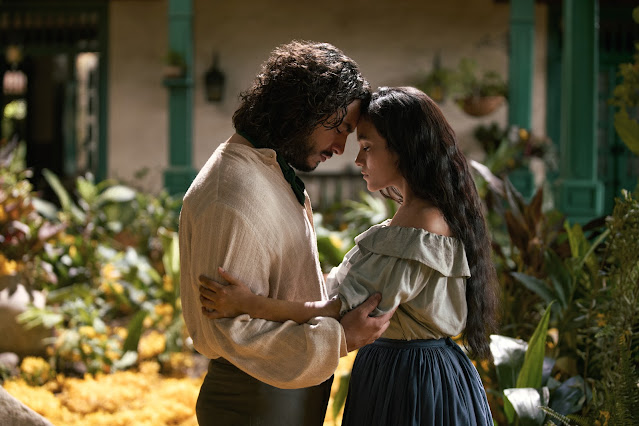This psychological reading into the characters of Jose Arcadio Buendia and Ursula Iguaran unravels their complex behaviors through the lens of personal experiences, societal influences, and shifting cultural paradigms. Moments and events displayed in Episode 2 of One Hundred Years of Solitude Netflix series are considered to illustrate how the psyche of these characters is shaped by their environment and interactions.
Prelude: The Isolation of Macondo and Its Psychological Impact
Macondo, the town founded by Jose Arcadio Buendia and Ursula Iguaran, serves as a metaphorical Eden, an untouched world created from the sweat and cooperation of its settlers. These settlers, like the Biblical Adam and Eve, carried with them a raw, instinctive knowledge of survival. The isolation of Macondo fostered a tight-knit community, where trust and mutual reliance formed the bedrock of their social fabric. This environment influenced the Buendías’ psychological outlook, emphasizing loyalty, shared responsibility, and a profound connection to their surroundings. However, this isolation also meant that the Buendías, particularly José Arcadio Buendía, remained unexposed to external cultural values, setting the stage for psychological tension as new influences crept into their world.
The Trust and Familial Bond in Macondo
The episode highlights Ursula Iguaran’s unwavering trust in her family and community. Her decision to leave her infant daughter, Amaranta, behind while searching for her son, Jose Arcadio, is emblematic of the deep-seated trust that permeated Macondo’s social structure. Psychologically, this trust reflects Ursula’s belief in the collective responsibility of her community and her husband’s competence, despite his reclusive nature. This level of trust is almost unthinkable in modern fragmented societies but was natural in Macondo’s nascent stage. It also reveals Úrsula’s pragmatism, as she prioritized the search for her son over her immediate domestic duties, relying on communal and familial structures to fill the gap.
Transformation of Ursula Iguaran : Exposure to External Cultures
Ursula’s five-month journey beyond the swamps is a turning point in her psychological development. Her exposure to more advanced civilizations imbued her with new values, cultural practices, and an elevated sense of self. This transformation is visible upon her return to Macondo, where she exudes confidence, grace, and a heightened sense of morality.
Her interaction with Pilar Ternera, who brought the child of Jose Arcadio to the Buendia household, underscores this shift. While Jose Arcadio Buendia embraced the child with warmth and unconditional love, Ursula’s reaction was one of rejection, citing “shame.” This moment is critical in understanding the psychological divergence between the couple.
José Arcadio Buendía’s way of thinking was shaped by Macondo’s early simple and fair way of life. He followed his instincts and emotions, caring more about people than about rules or judgments. His curious and creative mind helped build the town and keep it independent.
But he didn’t like outsiders interfering. That’s why he clashed with Don Apolinar Moscote, the mayor sent by the Colombian government. Buendía saw him as a threat to Macondo’s freedom and called him his “enemy.”
Ursula Iguaran’s adoption of external moral constructs, such as the concept of shame, reflects the psychological influence of her journey. Her exposure to “higher cultures” introduced her to rigid social codes, which she internalized and began to impose within the family.
This clash reveals the tension between isolation and integration, a recurring theme in the Buendia family saga. Ursula’s journey symbolizes the inevitable encroachment of external norms into the insulated world of Macondo, and her reaction to Pilar’s child highlights the psychological cost of such integration—an erosion of the community’s original, untainted values. A decade or so later, Colonel Auroliano Buendia following legacy of his father Jose Arcadio Buendia, leads a revolt against Columbian government, while his mother Ursula stands stands in defense, praising the integrity and character of the new chief of Mocando, General Jose Raquel Moncada
Jose Arcadio Buendia: The Scientist’s Detachment
Jose Arcadio Buendia’s reclusive behavior, often locking himself in his study, speaks to his intellectual curiosity but also hints at psychological detachment. His preoccupation with science and discovery mirrors his detachment from societal norms and familial conflicts. His reaction to the child brought by Pilar is pure and untainted by moral constructs, emphasizing his emotional innocence and scientific rationality over cultural dogma. This detachment, however, also makes him less attuned to the changing dynamics in Mocando, leading to moments of conflict and misunderstanding.
Conclusion: A Psychological Dichotomy
Episode 2 of One Hundred Years of Solitude vividly portrays the psychological evolution of Jose Arcadio Buendia and Ursula Iguaran as they navigate the tension between isolation and exposure. Úrsula’s transformation represents the psychological impact of cultural assimilation, while José Arcadio Buendía’s reaction to the child underscores the innocence and emotional purity of a mind untouched by external moralities.
This analysis reveals how individual psyches are profoundly shaped by their social and environmental contexts. The Buendías’ evolving dynamics mirror the broader human struggle between preserving one’s roots and adapting to new realities, a tension that defines not only the family but the very essence of Macondo itself.


